We have thousands of human-written stories, discussions, interviews and reviews from today through the past 20+ years. Find them here:
ASTA 2025: Exploring Improvisation with Alice Kanack, Tracy Silverman and Jason Anick
One reason I make it a priority to go to the yearly American String Teachers Association Conference is that it gives me the opportunity to see the most innovative teachers - people really at the top of this industry - in person. I can meet them, listen to them talk about their work, and learn what they are doing in the classroom and studio.
By the time I leave ASTA, I always feel like I've picked up something new for my teaching, something new for my playing, and gained a new understanding of the trends that are emerging from the new ways people are teaching and looking at things.
This year's conference in Atlanta was no different, and so I will share a few of the wonderful classes and encounters that inspired me over my three days there. Today I wanted to talk about some revelations on the topic of improvisation and style, from three different educators who are all brilliant innovators: the teacher that Shinichi Suzuki called "Mozart's Mother" Alice Kanack, electric violinist Tracy Silverman and Berklee College of Music Professor Jason Anick.
Alice Kanack: Creative Ability Development
"The thing that a child wants to do, when you put an instrument into their hands, is to make up a new song," said Alice Kanack at her ASTA session. A child doesn't necessarily want to repeat a bunch of rhythms - which is typically what we make them do.
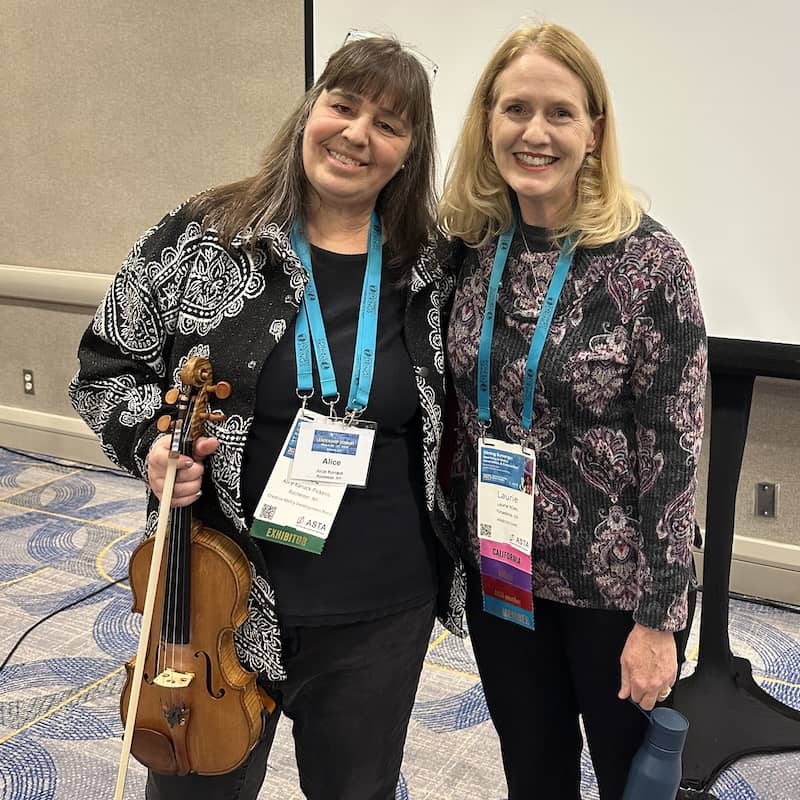
Alice Kanack and Laurie Niles.
But what if there was a creative and fun way to achieve both ends - get them practicing technique while also exercising their creative impulses? This is what Alice has been working on for the last four decades or so, and the result is her Creative Ability Development method, which is laid out in five books that she has written.
I had heard about Alice Kanack very recently - when I was interviewing the composer Jessie Montgomery. Alice was Jessie's first violin teacher, and Jessie she said that it was Alice and her wonderful improvisation classes that kept her interested in the violin when she experienced a period of discouragement and even thought about quitting, as a young student.
It was a treat to see Alice's ideas in action - about a half-dozen of her students were on hand to demonstrate pieces from her latest book, called Playing from the Heart, which aims to use improvisation as a primary tool to teach beginners, with 81 audio tracks with which to improvise.
She has made these tracks so fun - each improvisation is named for an animal, and each sets certain parameters that allow the student to freely improvise. For example, "Hamster on a Wheel" simply explores open strings. "Flying Fish" lets you play around with harmonics. "Woodpecker" is about left-hand articulations and finger strength - "pluck and place." For a little inspiration, Alice showed a slide with the animal for each song.
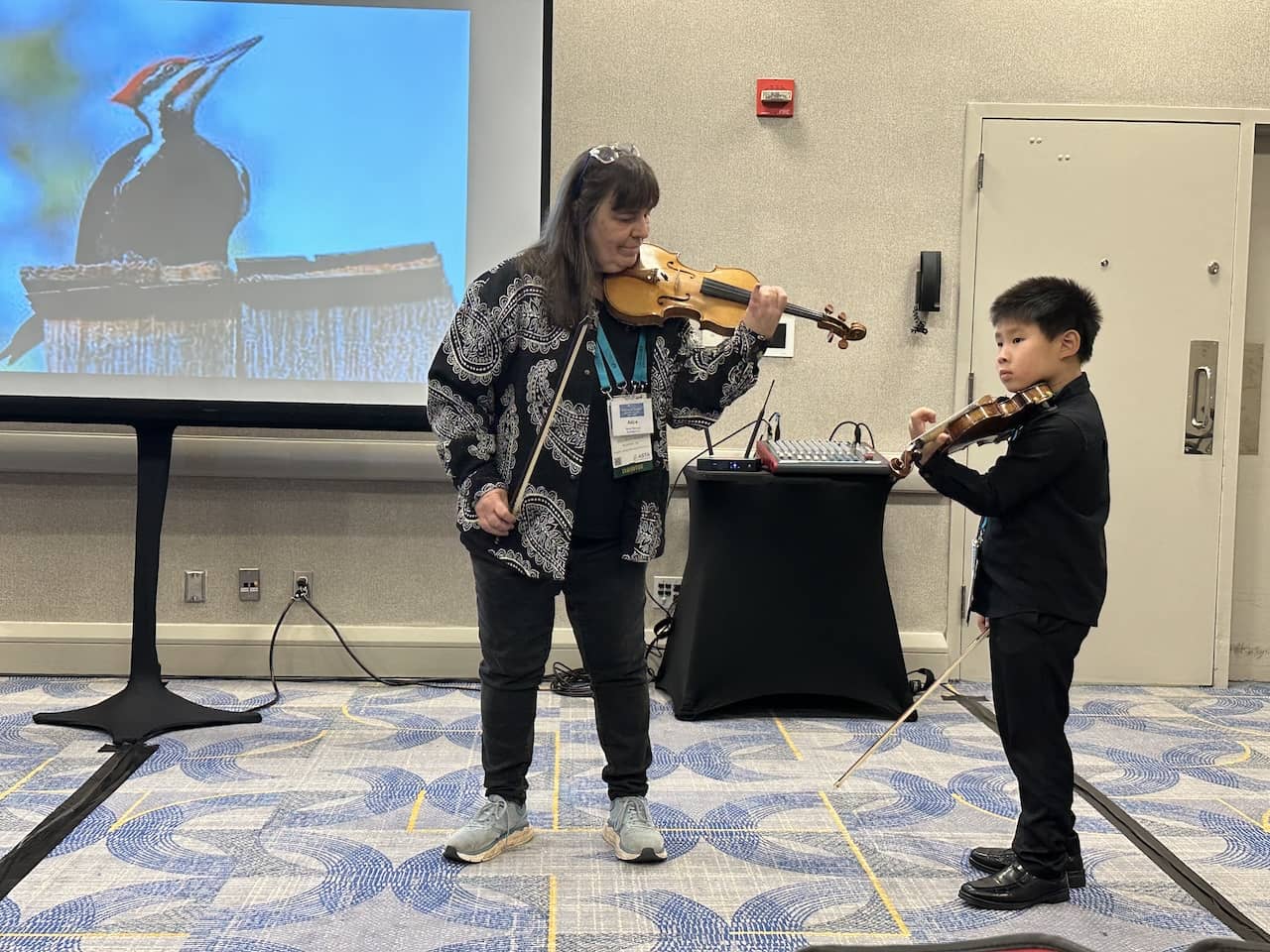
"Woodpecker" - Alice Kanack and Ethan improvise.
The "Honeybee" is about "popping fingers" or trills. For "Minnows" you simply play around with using opening As and Es and first-finger. And the techniques get increasingly more difficult - she has tracks for octaves, various positions, pentatonic scales.
"Things that are difficult - like octaves - get looser, get a little easier, because we're not trying to read from some page of music," she said.
Alice emphasizes that "there is no such thing as a mistake," when improvising, and she tells students that they must "never criticize a friend." They are also instructed to listen intently to one another and to applaud each other's efforts. Her students played with assurance and interacted with a spirit of cooperation and support for one another.
Alice talked about something she called "Pinocchio Syndrome" - "A lot of music teachers are Geppettos," she said, referring to woodcarver who created the boy puppet. "We are carving our students to be puppets and teaching them to move and speak like us. What if we could also be the blue fairy and bring the puppet to life?"
Alice has spent years analyzing the creative process, as it relates to music. To boil it down to a simple formula: creativity + music = musicality. There is work and repetition and practice involved - but students are also given a wide berth for experimentation and making their own choices.
Also, "all ideals grow from ideas that come before," so it is okay to copy others.
In order to be that "blue fairy" that brings Pinocchio to life, a teacher must be able to listen without criticism, provide a safe place for experimentation, and educate parents to set expectations, because creativity does not happen overnight.
"Creative ability grows through practice, and it takes a long time," Alice said.
Tracy Silverman: Strum Bowing Groove Academy
Walking around the exhibition floor - where some 90 exhibitors were showing instruments, cases, sheet music, music schools, accessories and more - it was clear that something fun was happening over at Tracy Silverman's booth.
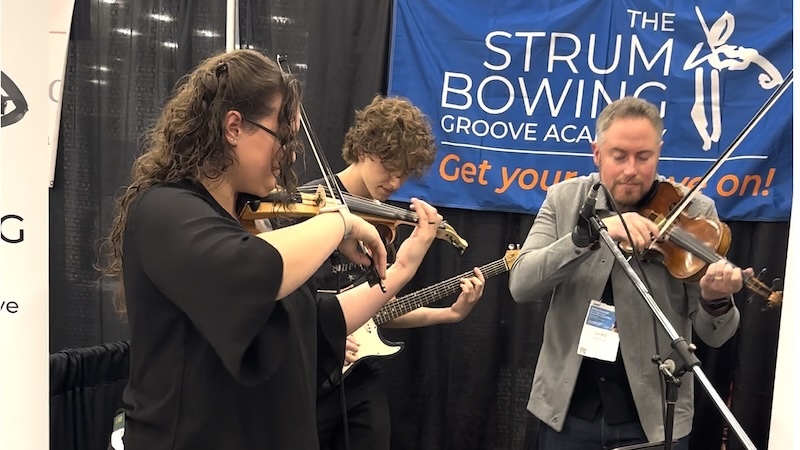
Tracy Silverman's Strum Bowing booth.
People were jamming to his karaoke tracks, and Tracy himself was on hand to explain his Strum Bowing program, which teaches groove and jamming skills to string players of all kinds. Tracy - a graduate of Juilliard and former first violinist of the Turtle Island String Quartet - is an electric violinist and clearly a natural teacher. He gave me a spontaneous lesson in “ghosting,” a very cool bowing technique used in jazz, fiddle and more. Basically, you keep the bow moving, but punch out certain rhythms while "ghosting" the other notes. It's a bit tricky! My friend Stephanie Flack caught it all on video:
Excitingly, Tracy told me that he is devising jam tracks for the tunes in the Suzuki books - stay tuned for more on that!
Jason Anick: Jazz Manouche - a Link Between Classical and Jazz
Just tell me that Jason Anick is going to be in the room, and I'll be there. Jason is a professor of jazz violin at Berklee College and a top-form jazz violinist. If you remember the pandemic (we all try to forget, I know, but this was a bright spot...) Jason was our very first guest on Gilharmonic, the show Violinist.com did with Gil Shaham to try and cheer everyone up. Jason also has a game-changing book of short etudes designed to "forever change the way you look at the fingerboard" called Violin Fingerboard Mastery - a bridge for the classical musician wishing to learn improvisation skills.
At ASTA Jason was - as always - preaching jazz.
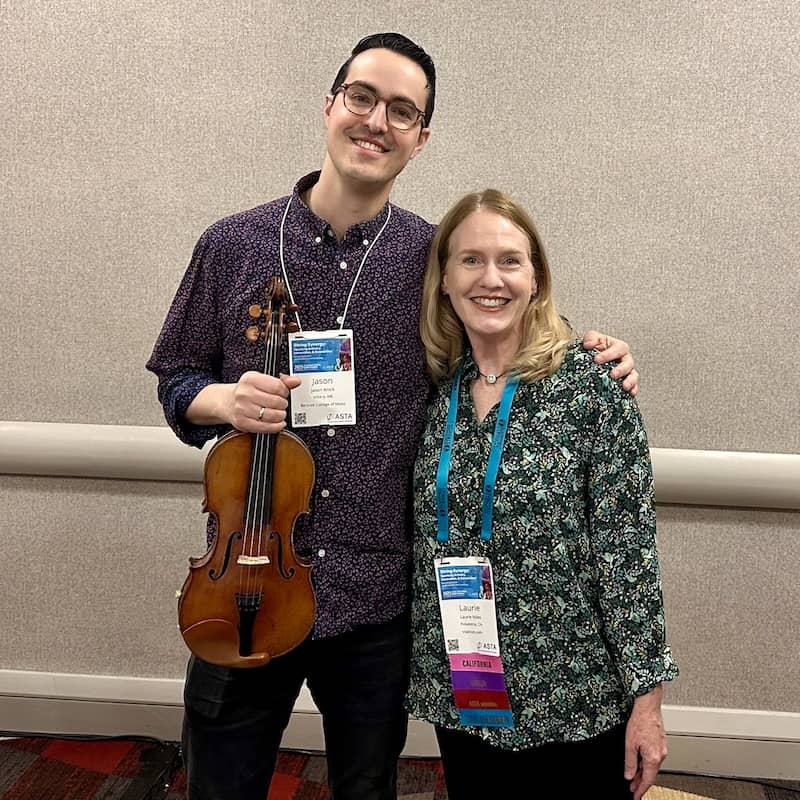
Jazz violinist and Berklee College of Music professorJason Anick and Violinist.com's Laurie Niles.
"To me, Bach was the first jazz musician," Jason said - after all, J.S. Bach was a master improvisor, and clearly he understood chord progressions. But modern-day classical musicians often shy away from jazz - we look at the breakneck bebop of a jazz artist like Coltrane and get a little scared.
A better entry point might be "Jazz Menouche" or "Gypsy Jazz" - music of artists such as Jean "Django" Reinhardt and Stéphane Grappelli, where "the violinist is at the center of this genre," Jason said.
When he was 11 years old, Jason actually met the French jazz violinist Stéphane Grappelli, who was 87 at the time. It was Grappelli's last performance.
"It was so organic, his ability to be in the moment and improvise," Jason said. "This style of music really touched me."
Anick suggested the iconic song "Minor Swing" as a great "first tune" for a student - or a classical player - who wishes to get started with jazz. It has an infectious rhythmic style as well as relatively simple chord changes - and beyond that, it's joyful.
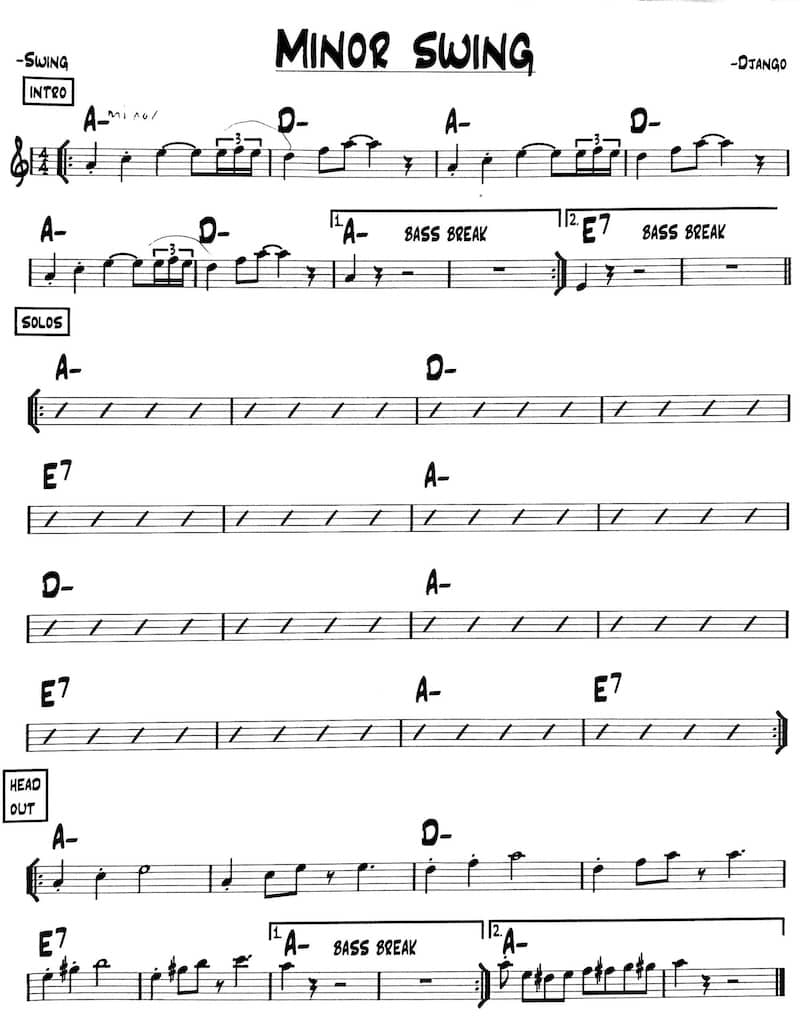
Here are a few things Jason suggested, for teaching and learning:
- Try listening to a solo and mimic it exactly (some great solos here, the Youtube of Django Reinhardt & Stephane Grappelli)
- Play along with Jason's band, the Rhythm Future Quartet - here is their play-along track for Minor Swing.
- Look at the lead sheet and find the chords - write them out and then follow the chord stacks to create a line.
"We can take an arpeggio and do a thousand different things with it," Jason said.
In playing jazz, one has to "shut off the classical brain" and do a stylistic flip. Here are a few different ways:
- Control accents
- Start with notes in the chord, then add notes outside the chords
- Release fingers for bow styles like "ghosting" (see above!) "It's hard to control that, but it's ome of the most exciting stuff!" Jason said.
- Shut off "auto-vibrato" and instead use it as a color
And for fun: Jason and his Rhythm Future Quartet perform "Minor Swing":
You might also like:
- Violinist.com Interview with Composer Jessie Montgomery
- ASTA 2025: Yumi Kendall and Joseph Conyers - Changing the World Through Music
- ASTA 2025: Expanding the Canon - Violin Works by Women Composers
* * *
Enjoying Violinist.com? Click here to sign up for our free, bi-weekly email newsletter. And if you've already signed up, please invite your friends! Thank you.
Replies
Elizabeth , I started violin at my public school in Aurora, Colorado - I never would have started, had that program not existed. No one in my family was a musician. I fell in love with harmony the first day I got to play in my elementary school’s beginning orchestra, and the book we used was “Learn to Play in the Orchestra” by your father Ralph Matesky. I’m very grateful.
Something I constantly learn from the talented teachers (who are also talented musicians) that I have had the privilege to observe is that there are many, many different ways to learn, many different ways to express oneself with the violin, and also many extremely talented violinists that play in myriad genres. Sure, listen to the great violinists of the past, but know that we live among great violinists of the present, and they deserve our respect.
I am in awe of the thriving school orchestra programs I see at ASTA. It is one thing to teach the privileged and absolutely another to inspire dedication and nurture talent in the children who walk into your classroom with no such advantages. Kudos to the teachers who show this kind of dedication, truly. It is a TALENT, for sure.
A return to funding and support for music education programs in public schools would be a great place to start, if our art is to continue to thrive. Education- not just at the elite level - lifts all boats.
Response to Editor, Laurie Niles' concerns for Music Teaching Art to continue & 'thrive' from daughter of Ralph Matesky, Elisabeth Anne Matesky, having posted Reply {#1} with Reply {#2} After Thoughts ... {#3}
Firstly, I am deeply moved Laurie Niles had very comprehensive and most importantly her initial exposure to teaching from my now late father, Ralph Matesky, who was proclaimed after years of Music Directorship in the LA County Schools, 'The Father of the Youth Orchestra Movement in America' who believed in every pupil he ever encountered no matter their background and in spite of those coming from lesser Family backgrounds not privy to attending even one concert by an orchestra or hearing a superb concert if fortunate enough to get a ticket to the Los Angeles Philharmonic even in the days when all 'major' Orchestras in America were fighting for musicians rights re year round salaries and health/dental insurance plus life pensions after service in this orchestra and other major orchestras in other parts of the United States ... The Trials experienced led to those who had achieved some security earning jobs, learned it was not Forever but had to be continuously addressed by next incoming generations of string colleagues ... Trials are those very uncomfortable times in our lives when we know not where our next dollar/s shall come from but in being so unsure we Do Learn to become self sufficient with the resulting Lesson to not depend on anyone else or Government or any offer of lifetime compensation which finally was mandated by the U.S. Government with the advent of Social Security ... Not in any position to further discuss political matters this is mentioned to draw a parallel between Real Life Stresses and those of musicians in our country who despite superb training turn to teaching for their livelihood's more often than not ... There are no more 'Elite's' in Music or Music in America or at this time {IMO} due to many tough times all having interfered with regular Music Concerts provided by major Cities with major American Orchestras and the traumatic circumstances experienced by All of Us due to the Global Pandemic from late January in 2020 to very recent times and enormous adjustments in Salaries including returning to work & in safe environments with immense budget losses due no live audiences allowed during a major portion of the Pandemic and all finding our and their way in individual circumstances ... Just because some of us were truly blessed to study with the 'Elite's' in Violin or Viola or Violoncello once remarkably prepared and via many of my father's unique and for children magical teachings via RM Music loving compositions for elementary school children in the orchestra and many Teaching Texts, simply means and equalled any child intent on pursuing Music due to Loving it had a better chance to realise some of his/her dreams being more prepared and in this fortunate circumstance being able to 'see' a future which could be bright making music with one's peers in orchestral situations and also in Chamber Music SQ's and the many variations of ensembles in the Los Angeles (I once termed it} 'In The Pink' LA of the later 50s & all of the '60s and a bit further with such 'Giants Who Walked the Earth' in our very midst if attending College in Los Angeles or in the entire LA Basin! I agree with Laurie Niles about varying genres yet sensed a sort of questioning of 'Elite's' which might refer to the GOAT's Jascha Heifetz; Gregor Piatigorsky; William Primrose; Gabor Rejto; Eudice Shapiro and Joachim Chassman, all of whom were our beyond distinguished Concert Artists & gravitating to many gorgeous area's of LA with the wonderful weather plus settling in After major portions of their astonishing Concert giving Careers to then Teach/aka, Mentor those whom they thought worthy of their time and interest & Teach which was a Gift to Southern California and the whole of this Great Country during Post WWII and for many year decades following WWII ~ I hope with all my heart the blessings of Artist Teaching from all of the above mentioned are not thought of as being just 'elite' but as 'Key's' into many technical & then musical knowledge which uplifted so many pupil's of those named with emphasis unknown by those not fortunate enough to meet or know of their inner commitments to Music for future Crop's Mentored by to go forward to play concerts then to mentor the next generation with rare knowledge in Music and passed on to then continue the process of growth as musicians in the future! Indeed, many of us are grateful for current artists now playing yet I'd be bereft if not mentioning & expressed to me by many colleagues and those having been Under The Wings of Grandest Artists w/their true concerts that many from faraway places now lack the roots & Soil from which our mentor's harkened and as it is with every new generation, We Must try to pass on that which was gifted to us for our own desired betterment for a Future of Music at its Very Best and for our Youth to develop disciplines otherwise not known to avoid faulty paths followed unless learned early on via great early mentor's like my own father and mother who sowed the seeds of all w/aspirations to be the Best each of Us Could Be!
Never before so challenged I welcome this with the intention of both learning from Laurie's personal perspective right now and also in offering my own perspective as a very fortunate little child in a household of rare musical parents & their esteemed colleagues all of whom were taken in by a little girl with dreams to play the violin just like 'Uncle' Toscha Seidel, a close friend & colleague of both my parents, with Poppa Ralph also a superb Conductor, collaborating with the Great Russian Violinist (colleague of Mr. Heifetz from Auer Student Days) and hearing the luscious Sound of Uncle Toscha's Strad Violin which determined one's own concept of sound which led to my own Sound Idea with his lushness forever in one's Ears and Heart ... Thanking Laurie Niles for her open-ness and deeply moved to know she was enriched when at first learning the violin by Poppa Ralph's titled original Text "Learning to Play in The Orchestra", I will hold the memories of Laurie most dear in my own heart! Thank You, dear Laurie for your loving kindness in gladly sharing this with me and now when looking back at one's Life from Day One to The Present and a hoped for Open View of The yet to be Future Unknown ~
~ ~ Accept Warm Musical Wishes ~ ~
.......... Elisabeth Matesky ..........
P.S. Laurie ~ Poppa Ralph called me 'Lizzie'!
Fwd ~ dmg
Just very briefly: Laurie & Elisabeth, what a beautiful piece of happenstance!
This article has been archived and is no longer accepting comments.













April 6, 2025 at 11:03 PM · Re: String Teaching and Teachers at ASTA 2025! {#1}
As a pupil of my father, firstly, until I was accepted by Jascha Heifetz in his Original Jascha Heifetz Violin Master Class at USC's Institute for Special Music Studies Programme with Mister's Heifetz, Piatigorsky & William Primrose (Viola) I was early at aged 3 taught to enjoy the Violin and was also taught immense discipline with and without any one supervising my practising by the time I was aged 11. My Point: Playing and Learning to Play The Violin Is an Ongoing Process from a Starting point of great interest, call it even intrigue with the Instrument for a child who early on expresses a Love for the Sound of the Violin and also gravitates to the Piano, and a most important instrument in any violinist's development if wishing to attain some true proficiency on the Violin! It also needs to be Fun! Poppa Ralph, btw, former ASTA National President who under his tenure built the ASTA Organisation to International Prominence, taught hundreds and thousands of children in the Compton City Schools and throughout the LA basin as Supervisor of Music in the LA City Schools and also helped numerous other String Cousins to learn How to play their string instruments and from Day One! It is mythical to try teaching Jazz too early without the root grounded principles in string playing and major component, Bowing!! I like hearing about Jason of Jazz, yet he is if I'm correct, speaking as a valued Pro by now and as Poppa Ralph Matesky, (google his name) always said: "You can not teach that which You Can NOT DO!" Period, End of Sentence!!
I am not here to criticise some who shared their own ideas of How to play the Violin or a stringed instrument including the Guitar and to suggest their own individual discoveries but I am here as a Concert Artist having Done The Work all my Life and practised with Focus 6 to 8 hours per day to attain the highest peaks of Violin Artistry one can aspire to and I must mention both my Iconic Violin Mentors in Order chronologically: Jascha Heifetz, for whom 'The Board' of the violin and demanded one play any number of Scales and their corresponding arpeggios/Thirds/Sixths/Octaves/ Fingered Octaves/ and Tenths plus one's own Idea's to also learn 1/2 configurations which I did often encounter when playing more 'contemporary' works like the Alban Berg Violin Concerto; or the Stravinsky 'Duo Concertante' & w/Pianist Teacher of Aaron Copland; Gian Carlo Menotti and Samuel Barber all of whom studied with my Pianist gloried partner, Mme Nadia Boulanger, in her Paris Studio/s and at the Paris Conservatoire of Music ... The point here is not to boast but to offer A Truth = playing violin has many 'level's' of preparedness which Is Good for All Violin Loving players who need not practise 8 hours pr day prior to recording the Shostakovich First Violin Concerto and with a major German Orchestra, Bamberger Symphoniker, but knowing the violin fingerboard and How to Bow with Elan and Brushing of the Bow to attain sotto voce sounds needed for Soloist Playing requiring careful lifetime nurturing and hopefully by Those Who Can Play as Soloists with the Music in the forefront of all else and it goes without saying one must commit a life to the practise room which is often dreary if one is encountering difficulties with no solutions minus a Mentor like my other Mentor, Nathan Milstein, who was known as Master of The Bow as witnessed by many who come here on Violinist.com who rave about Mr. Milstein and many worship the Milstein Unaccompanied Bach Six Sonatas & Partitas which provide Spiritual Guidance and also if one is seriously studying all Nathan Milstein does with his bow, great care taken re offering the many chordal voices inserted by Johann Sebastian Bach in his Grand Sonatas & Partitas which one will never learn if not in company of Grand Artists ... But it is important for all who love playing the violin to Listen and Learn from GOAT Masters in the first instance and continuing on into a lifetime of listening and attending Concerts by Grand Artists which is more difficult, IMHO, now due to so few knowing the true elements of How to Bow in Bach and in Baroque works minus a baroque Bow which Mr. Milstein detested to tell the truth due his sense of a sort of 'cheating' with a more rounded made baroque bow avoiding the Art of How to Bow all chords even if on all Four Strings simultaneously which NM did and taught yours truly to do also!!!
I take the jazz side and Stephane Grappelli's Art in Jazz violin playing most seriously but I feel thus far from Laurie's words about her chats with the above who shared their ideas re Jazz playing and students in playing starting out, all well and good, yet none have uttered thus far any awareness of the Word, TALENT!!! Talent for the Violin is almost a foregone conclusion in the World of Concert Violin for one just doesn't pick up a Violin as Ida Haendel did at aged 4 and just play a simple Bach a minor Violin Concerto unless Talent and Great Talent is part of one's DNA at Birth!! So, for me, Talent is a necessary ingredient which can not be manufactured no matter how hard one tries!!! We are human beings being gifted at birth with various gifts for Music; Science; Math; Sports; Writing; Poets; Authors; Movie wanna be Producers. Engineers, Engineer caretakers of Architecturally glorious buildings and those gifted with Skills for Agriculture, Law, Medicine, and the Trades so needed and the List is Endless!!!
In closing I would be overjoyed to See in All Public Schools the inclusion at last of Instrumental Music once again taught and by the finest String Educator's coming out of Juilliard which IMO does Not focus on preparing students for this Very Necessary Art of teaching in the public schools where more than less kids have no Family backgrounds or preparedness by poorer family lives than many other pupils who do go to Juilliard with Highest Dreams of Concert Artistrydom which sadly is a Tough Long Road and demands the giving up of many younger people of Fun in Life when so young ... It is A Choice all professional Musicians Make early on and Do choose foregoing many Fun at-the- time activities yet in the US right now I do not see much focus from ASTA or other String Organisations on the necessity of playing in a string ensemble or in a school orchestra taught by one who has played truly professionally in major orchestral concerts or has been exposed to this World of Professionalism which Must be Brought Back as I witnessed 24/7 in our LA suburban home whilst growing up with 2 remarkable musician parents who started out with nothing yet had the discipline and Love to make Music wishing to help those with the least without any ideas of prejudice just because children came from poor and poorest of families yet loved the violin or cello or viola double bass and Piano wishing to play in an Orchestra Someday!!! No words from myself are needed yet I wish to compliment all 3 Teachers whom Laurie Niles has brought on to her Violinist.com forum Today and to suggest learning more about each of the Three Special String teachers invited to give presentations by ASTA whom I've know of since around aged 12 when Poppa Ralph was at first Editor of the ASTA Magazine progressing upwards to other posts with the very new at the time organisation and went all the way to the Top and founded many Awards now presented including The ASTA Artist Teacher Award and The ASTA Distinguished Service Award when President of ASTA US and inspired the UK musicians many of whom I got to know living in London over 8 years and loving it concertising and the like, with one of Poppa's British Violinist protege's founding ESTA to complement US ASTA and I pray it thrives much more in these years of Looking Back from my own Violinist veteran Concert Artist View Now!!!
Thanking Laurie Niles for her faithfulness to ASTA on behalf of both my now late parents with Momma B founding The Ralph Matesky Award in memory of Dad, Ralph Matesky, who truly expanded ASTA into an Internationally respected String Organisation overseas and would be delighted to see ASTA's Nat'l Solo String Competition come back having learned from a former ASTA President attending the recent 2025 ASTA National Conference the String Competition has not been ongoing due no funding for Award Prize Monies ... This, dear violinist friends Is So Sad and needs to be resurrected sooner than Later to now inspire not oppress those with Big Dreams which is What made American Music and Musician Mentor's So revered via Legacy passed on Authenticity ~
~ ~ ~ Yours Musically from Chicago ~ ~ ~
........ Elisabeth Matesky ........
Fwd ~ dmg